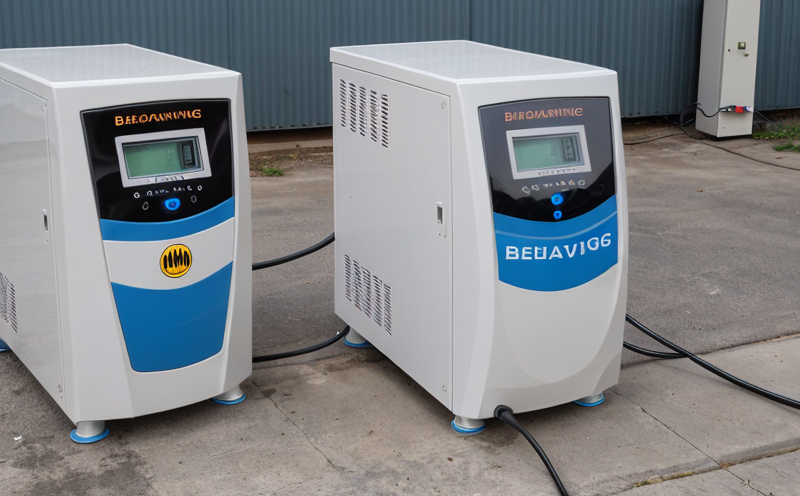UNE EN 62660 Charging and Discharging Testing of Lithium-Ion Cells for EVs
The UNE EN 62660 standard is a crucial document in the field of battery testing, particularly focusing on the charging and discharging behavior of lithium-ion cells intended for electric vehicles (EVs). This standard provides comprehensive guidelines to ensure that these cells meet stringent quality and safety requirements. As an accredited laboratory with expertise in this area, our services encompass not only compliance testing but also detailed analysis aimed at improving product performance.
The test procedures outlined in UNE EN 62660 are designed to evaluate the charging and discharging characteristics of lithium-ion cells under controlled conditions. These tests are essential for understanding how well a cell can handle the stresses imposed by real-world usage scenarios, such as rapid charging or deep discharge. The standard covers parameters like charge termination voltage, maximum allowable charge current, minimum allowable discharge capacity, and more.
From a manufacturing perspective, these tests play a vital role in quality control processes. They help manufacturers identify potential flaws early on during the production cycle by simulating actual use conditions. This proactive approach ensures that only high-quality cells make it to market, reducing the risk of product failures post-launch.
In addition to its application in manufacturing, UNE EN 62660 also serves as a valuable tool for research and development (R&D) efforts aimed at improving battery technologies. By providing consistent and reproducible testing methods, the standard allows researchers across different organizations to compare results reliably. This collaborative environment fosters innovation within the industry.
For procurement teams, adherence to UNE EN 62660 ensures that they source reliable suppliers who can consistently deliver products meeting international standards. This not only enhances supply chain efficiency but also contributes positively towards overall brand reputation.
To sum up, implementing UNE EN 62660 charging and discharging testing protocols is critical for any organization involved in the development or production of lithium-ion cells destined for electric vehicles. It provides a robust framework for assessing cell performance while promoting quality assurance practices that benefit all stakeholders throughout the supply chain.
Applied Standards
The UNE EN 62660 standard is widely recognized and adopted globally, particularly within the automotive and electronics industries. It harmonizes with other internationally accepted standards such as IEC 61974-3 and ISO/IEC 17025 for quality management systems in testing laboratories.
- UNE EN 62660: Charging and discharging behavior of lithium-ion cells intended for electric vehicles (EVs).
- IEC 61974-3: Safety requirements for electrical equipment used in association with EVs.
- ISO/IEC 17025: General requirements for the competence of testing and calibration laboratories.
The combination of these standards ensures a comprehensive approach to both safety and quality when dealing with lithium-ion cells intended for EV applications.
Benefits
- Enhanced Product Quality: Identifies potential issues early in the production cycle through rigorous testing.
- Increased Reliability: Ensures that only high-quality cells reach market, reducing post-launch product failures.
- Better Innovation: Allows collaborative environments among different organizations which promotes innovation within the industry.
- Compliance Assurance: Helps companies ensure their products meet international standards, enhancing brand reputation and customer trust.
The implementation of UNE EN 62660 not only benefits individual manufacturers but also contributes to the broader automotive sector by promoting safety, reliability, and innovation. By adhering strictly to these stringent testing protocols, organizations can gain a competitive edge in their respective markets.
Competitive Advantage and Market Impact
The ability to comply with UNE EN 62660 sets organizations apart by demonstrating their commitment to delivering safe, reliable, and high-performance lithium-ion cells. This standard ensures that products meet stringent quality and safety requirements, thereby reducing the risk of product failures post-launch.
Compliance also enhances brand reputation and customer trust, which are crucial factors in today's competitive market environment. By ensuring that their products adhere to internationally recognized standards, companies can build long-term relationships with customers while maintaining a strong foothold in their respective markets.
In addition, adhering to UNE EN 62660 fosters an innovative ecosystem where researchers and developers from different organizations can collaborate freely. This collaborative environment encourages the exchange of knowledge and ideas, leading to continuous improvements in technology and performance.
Overall, the implementation of UNE EN 62660 charging and discharging testing protocols provides a robust framework for assessing cell performance while promoting quality assurance practices that benefit all stakeholders throughout the supply chain. Organizations that invest in these stringent testing methods are likely to see significant improvements in product reliability, safety, and market position.





